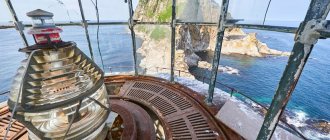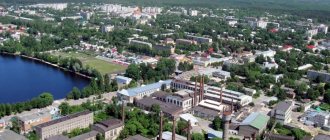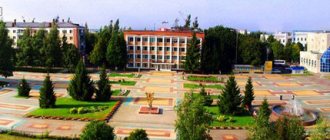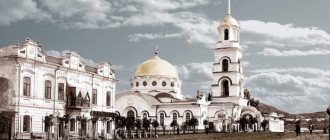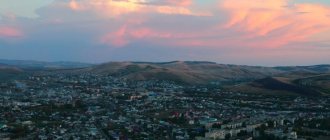This term has other meanings, see Ostrovny (meanings).
| City Ostrovny Coat of arms |
| A country | Russia, Russia |
| Subject of the federation | Murmansk regionMurmansk region |
| Urban district | ZATO Ostrovnoy |
| Coordinates | 68°03′11″ n. w. 39°30′47″ E. d. / 68.05306° n. w. 39.51306° E. d. / 68.05306; 39.51306 (G) [www.openstreetmap.org/?mlat=68.05306&mlon=39.51306&zoom=12 (O)] (Z)Coordinates: 68°03′11″ N. w. 39°30′47″ E. d. / 68.05306° n. w. 39.51306° E. d. / 68.05306; 39.51306 (G) [www.openstreetmap.org/?mlat=68.05306&mlon=39.51306&zoom=12 (O)] (I) |
| Head of ZATO Ostrovnoy | Chistopashin Gennady Vasilievich |
| Based | 1920 |
| First mention | 16th century |
| Former names | until 1920 — Yokanga churchyard before 1938 - |
| City with | 1981 |
| Center height | 11 |
| Population | ↘1960[1] people (2016) |
| Timezone | UTC+3 |
| Telephone code | +7 81558 |
| Postcode | 184640 |
| Vehicle code | 51 |
| OKATO code | [classif.spb.ru/classificators/view/okt.php?st=A&kr=1&kod=47531 47 531] |
| Official site | [www.zato-ostrov.ru/ o-ostrov.ru] |
| Ostrovny Moscow |
| Murmansk Ostrovny |
Audio, photo and video
on Wikimedia Commons
K: Settlements founded in 1920
Ostrovnoy
(until 1920 -
Yokanga churchyard
, until 1938 - the village
of Yokanga
, until 1981 - the village of
Gremikha
) - a city in the Murmansk region of Russia, the center of the urban district of the closed city of Ostrovnoy.
Closed administrative-territorial entity (ZATO) Ostrovnoy is located on the coast of the Barents Sea near the Yokanga Islands, 12 km from the Yokanga River and west of Cape Svyatoy Nos, 360 km from Murmansk and 430 km from Arkhangelsk.
In the Closed Administrative Territorial Entity (ZATO) Ostrovnoy
The naval base of the Northern Fleet is located in Gremikha.
Population - 1960[1] people. (2016).
One of the smallest cities in Russia. Since 1996, its population has decreased by approximately 8 times.
Story
The official founding date of Jokanga (Jokanga churchyard, one of the 17 Sami settlements on the Kola Peninsula) is considered to be September 17, 1611 - the date of the first mention of this settlement[3].
September 17 is celebrated annually as the city's birthday; in 2011, the settlement celebrated its 400th anniversary[3].
Construction of the first naval base began here in 1915 during World War I (interrupted in 1917). The Main Naval Headquarters considered that it was easiest from here to control the Throat of the White Sea and the eastern sector of the Barents Sea.
From 1918 to 1920 it was part of the Northern Region. By order of Miller, a concentration camp was organized at the unfinished naval base.
In 1920, the Yokanga churchyard was renamed the village of Yokanga.
In 1930, the village became the administrative center of the Sami region.
The Sami region is an administrative-territorial unit within the Leningrad and Murmansk regions of the RSFSR with its center in the village of Ponoy, which existed in 1927-1962.
In total, 4 s/s were formed: Iokangsky, Lumbovsky, Ponoysky, Sosnovsky.
Iokangovsky and Lumbovsky s/s had the status of Lapp national ones.
In 1936, the Ponoisky district was renamed the Sami district, and its center was moved to the village of Yokanga.
In 1938, the village was renamed Gremikha.
On June 22, 1941, the Yokanga naval base was established in Gremikha.
In 1963, after the abolition of the Sami region, Gremikha became part of the Severomorsky district of the Murmansk region.
In 1981, Gremikha was transformed into the closed city of Ostrovnoy[3].
The city of Ostrovnoy itself was built in Soviet times, 3 km from Gremikha; the symbol “Murmansk-140” was also used as its name.
Currently, Gremikha is one of the storage sites for spent nuclear fuel from submarines of the Northern Fleet and the only place where it is possible to recharge reactors with liquid metal coolant.
As of 2008, the base was largely used to house decommissioned submarines.
As of 2014, all spent fuel from pressurized water reactors has been removed, and all spent removable parts of reactors with liquid metal coolant have been unloaded from submarines. It is expected that Gremikha will be cleared of nuclear fuel by 2022[4].
There is no road or rail connection with Ostrovny (although in 1951-1953 an attempt was made to build the Kola Railway to the city), so you can get there either by the motor ship “Klavdiya Elanskaya” (14 hours from Murmansk) or by helicopter .
Previously, an An-2 plane flew to the city, landing on the ice of the frozen lake Zmeeozero in winter, and on a specially prepared dirt strip not far from the city in summer.
The city's attractions
The city has its own attractions. Among them are many monuments and other attractions:
- Monument to the Deer.
- Monument to the victims of the Yokanga prison.
- Monument to the victims of the intervention.
- Monument to submariners who died during the Great Patriotic War.
- Memorial plaque in honor of the crew members of the nuclear submarine "K-159".
- Svyatonossky Bay.
Buses run within the city, and there is also a water connection with the city of Murmansk.
Go to the Murmansk region attractions page
Notes
- ↑ 123
www.gks.ru/free_doc/doc_2016/bul_dr/mun_obr2016.rar Population of the Russian Federation by municipalities as of January 1, 2016 - [mun.gov-murman.ru/local/ostrovnoy.shtml Urban district of ZATO Ostrovnoy. Murmansk region government website]
- ↑ 1 2 3
[saami.su/2010-08-16-08-13-05/400letie-yokangskogo-churchyard.html
Pshechenko
. 400th anniversary of the Yokanga churchyard] // saami.su - September 16, 2011. (Verified December 28, 2011) - [www.bellona.ru/articles_ru/articles_2013/1395673442.25 Rosatom and Bellona “synchronized watches” and were satisfied]
- ↑ 1234567891011
www.MojGorod.ru/murmansk_obl/ostrovnoj/index.html People's encyclopedia “My City”. Ostrovny - [www.perepis2002.ru/ct/doc/1_TOM_01_04.xls All-Russian Population Census 2002. Volume. 1, table 4. Population of Russia, federal districts, constituent entities of the Russian Federation, districts, urban settlements, rural settlements - regional centers and rural settlements with a population of 3 thousand or more]. [www.webcitation.org/65AdCU0q3 Archived from the original on February 3, 2012].
- [www.gks.ru/bgd/regl/B09_109/IssWWW.exe/Stg/d01/tabl-21-09.xls Number of permanent population of the Russian Federation by cities, urban-type settlements and districts as of January 1, 2009]. Retrieved January 2, 2014. [www.webcitation.org/6MJmu0z1u Archived from the original on January 2, 2014].
- [murmanskstat.gks.ru/wps/wcm/connect/rosstat_ts/murmanskstat/resources/aa332b004e80f75784f8f7b8fc91c3ba/14650.zip All-Russian Population Census 2010. Volume 1 “Number, distribution and age-sex composition of the population of the Murmansk region”]. Retrieved February 2, 2014. [www.webcitation.org/6N5F3qERD Archived from the original on February 2, 2014].
- www.gks.ru/dbscripts/munst/munst47/DBInet.cgi?pl=8112027 Murmansk region. Estimated resident population as of January 1, 2009-2015
- [www.gks.ru/free_doc/doc_2012/bul_dr/mun_obr2012.rar Population of the Russian Federation by municipalities. Table 35. Estimated resident population as of January 1, 2012]. Retrieved May 31, 2014. [www.webcitation.org/6PyOWbdMc Archived from the original on May 31, 2014].
- [www.gks.ru/free_doc/doc_2013/bul_dr/mun_obr2013.rar Population of the Russian Federation by municipalities as of January 1, 2013. - M.: Federal State Statistics Service Rosstat, 2013. - 528 p. (Table 33. Population of urban districts, municipal districts, urban and rural settlements, urban settlements, rural settlements)]. Retrieved November 16, 2013. [www.webcitation.org/6LAdCWSxH Archived from the original on November 16, 2013].
- [www.gks.ru/free_doc/doc_2014/bul_dr/mun_obr2014.rar Table 33. Population of the Russian Federation by municipalities as of January 1, 2014]. Retrieved August 2, 2014. [www.webcitation.org/6RWqP50QK Archived from the original on August 2, 2014].
- [www.gks.ru/free_doc/doc_2015/bul_dr/mun_obr2015.rar Population of the Russian Federation by municipalities as of January 1, 2015]. Retrieved August 6, 2015. [www.webcitation.org/6aaNzOlFO Archived from the original on August 6, 2015].
- taking into account the cities of Crimea
- [www.gks.ru/free_doc/doc_2016/bul_dr/mun_obr2016.rar Population of the Russian Federation by municipalities as of January 1, 2016. Table “31. Population of cities and towns by federal districts and constituent entities of the Russian Federation as of January 1, 2016.” RAR archive (1.0 MB)]
- Statistical collection [murmanskstat.gks.ru/census/DocLib1/Volumes%20official%20publication%20togo%20VPN-2010.aspx Number, distribution and age-sex composition of the population of the Murmansk region. Results of the All-Russian Population Census. Volume 1. 2012] / Federal State Statistics Service, Territorial body of the Federal State Statistics Service for the Murmansk region. Murmansk, 2012 - 75 p.
- [murmanskstat.gks.ru/census/DocLib7/02.doc Population of the Murmansk region by gender as of October 14, 2010]
Gremikha and Shoina are two neighboring villages
The village of Gremikha is located on the eastern shore of the Kola Peninsula, Murmansk region. The village of Shoina lies on the western coast of the Kanin Peninsula, Arkhangelsk region. Two neighboring peninsulas. They are separated only by two hundred kilometers of sea water.
These settlements have a lot in common, but there are also many differences. If Gremikha is located on a rocky surface, at an altitude of up to three hundred meters above sea level, then Shoina is on a low-lying, sandy surface and is separated from the invasion of sea waves only by sand dunes.
Both of these places have always been dangerous for navigation. In the Gremikha area there is a junction of the two seas, the White and Barents seas, the coast is rocky. Gremikha is the capital of the winds. The Shoina sea area is dangerous due to its sandy shoals and also frequent, strong northwest winds.
I had to sail, as a passenger of course, from Shoina to Arkhangelsk and back on the motor ship “Mudyug”, and later on the motor ship “Yushar”. From Murmansk to Gremikha and back on the motor ship “Sestroretsk” and on the motor ship “Ilya Repin”, from Arkhangelsk to Gremikha on the motor ship “Vaclav Vorovsky”. And the White Sea was not always calm. There were cases when ships waited out stormy weather near the island of Morzhovets. Even such a huge ship as the Vaclav Vorovsky was tossed on the waves like a matchbox in stormy weather when approaching Gremikha.
It just so happened that these two villages played a big role in my life and I consider it my life’s duty to tell about them in one book.
In one of these villages (Shoine) I grew up and received an education, and in another (Gremikha), I spent the three most significant years of my youth for me, when I served in the ranks of the Soviet Army.
Excerpt characterizing Ostrovnoy
There was silence. The Countess looked at the guest, smiling pleasantly, however, without hiding the fact that she would not be at all upset now if the guest got up and left. The guest's daughter was already straightening her dress, looking questioningly at her mother, when suddenly from the next room several men's and women's feet were heard running towards the door, the crash of a chair being snagged and knocked over, and a thirteen-year-old girl ran into the room, wrapping something in her short muslin skirt, and stopped in the middle rooms. It was obvious that she accidentally, with an uncalculated run, ran so far. At the same moment a student with a crimson collar, a guards officer, a fifteen-year-old girl and a fat, ruddy boy in a children's jacket appeared at the door. The count jumped up and, swaying, spread his arms wide around the running girl. - Oh, here she is! – he shouted laughing. - Birthday girl! Ma chere, birthday girl! “Ma chere, il ya un temps pour tout, [Darling, there is time for everything,” said the countess, pretending to be stern. “You keep spoiling her, Elie,” she added to her husband. “Bonjour, ma chere, je vous felicite, [Hello, my dear, I congratulate you,” said the guest. – Quelle delicuse enfant! “What a lovely child!” she added, turning to her mother. A dark-eyed, big-mouthed, ugly, but lively girl, with her childish open shoulders, which, shrinking, moved in her bodice from fast running, with her black curls bunched back, thin bare arms and small legs in lace pantaloons and open shoes, I was at that sweet age when a girl is no longer a child, and a child is not yet a girl. Turning away from her father, she ran up to her mother and, not paying any attention to her stern remark, hid her flushed face in the lace of her mother’s mantilla and laughed. She was laughing at something, talking abruptly about a doll that she had taken out from under her skirt. – See?... Doll... Mimi... See. And Natasha could no longer speak (everything seemed funny to her). She fell on top of her mother and laughed so loudly and loudly that everyone, even the prim guest, laughed against their will. - Well, go, go with your freak! - said the mother, feigning angrily pushing her daughter away. “This is my youngest,” she turned to the guest. Natasha, taking her face away from her mother’s lace scarf for a minute, looked at her from below through tears of laughter and hid her face again. The guest, forced to admire the family scene, considered it necessary to take some part in it. “Tell me, my dear,” she said, turning to Natasha, “how do you feel about this Mimi?” Daughter, right? Natasha did not like the tone of condescension to childish conversation with which the guest addressed her. She did not answer and looked at her guest seriously. Meanwhile, all this young generation: Boris - an officer, the son of Princess Anna Mikhailovna, Nikolai - a student, the eldest son of the count, Sonya - the count's fifteen-year-old niece, and little Petrusha - the youngest son, all settled in the living room and, apparently, tried to keep within the boundaries of decency the animation and gaiety that still breathed from every feature of them. It was clear that there, in the back rooms, from where they all ran so quickly, they were having more fun conversations than here about city gossip, the weather and Comtesse Apraksine. [about Countess Apraksina.] Occasionally they glanced at each other and could hardly restrain themselves from laughing. Two young men, a student and an officer, friends since childhood, were the same age and both were handsome, but did not look alike. Boris was a tall, fair-haired young man with regular, delicate features of a calm and handsome face; Nikolai was a short, curly-haired young man with an open expression on his face. Black hairs were already showing on his upper lip, and his whole face expressed impetuosity and enthusiasm. Nikolai blushed as soon as he entered the living room. It was clear that he was searching and could not find anything to say; Boris, on the contrary, immediately found himself and told him calmly, jokingly, how he knew this Mimi doll as a young girl with an undamaged nose, how she grew old in his memory at the age of five and how her head was cracked all over her skull. Having said this, he looked at Natasha. Natasha turned away from him, looked at her younger brother, who, with his eyes closed, was shaking with silent laughter, and, unable to hold on any longer, jumped and ran out of the room as quickly as her fast legs could carry her. Boris didn't laugh. - You seemed to want to go too, maman? Do you need a carriage? – he said, turning to his mother with a smile. “Yes, go, go, tell me to cook,” she said, pouring out. Boris quietly walked out the door and followed Natasha, the fat boy angrily ran after them, as if annoyed at the frustration that had occurred in his studies. Of the young people, not counting the countess's eldest daughter (who was four years older than her sister and already behaved like a grown-up) and the young lady's guest, Nikolai and Sonya's niece remained in the living room. Sonya was a thin, petite brunette with a soft gaze, shaded by long eyelashes, a thick black braid that wrapped around her head twice, and a yellowish tint to the skin on her face and especially on her bare, thin, but graceful, muscular arms and neck. With the smoothness of her movements, the softness and flexibility of her small limbs, and her somewhat cunning and reserved manner, she resembled a beautiful, but not yet fully formed kitten, which would become a lovely little cat. She apparently considered it decent to show participation in the general conversation with a smile; but against her will, from under her long thick eyelashes, she looked at her cousin [cousin] who was leaving for the army with such girlish passionate adoration that her smile could not deceive anyone for a moment, and it was clear that the cat sat down only to jump more energetically and play with your sauce as soon as they, like Boris and Natasha, get out of this living room. “Yes, ma chere,” said the old count, turning to his guest and pointing to his Nicholas. - His friend Boris was promoted to officer, and out of friendship he does not want to lag behind him; he leaves both the university and me as an old man: he goes into military service, ma chere. And his place in the archive was ready, and that was it. Is that friendship? - said the count questioningly. “But they say war has been declared,” said the guest. “They’ve been saying this for a long time,” said the count. “They’ll talk and talk again and leave it at that.” Ma chere, that’s friendship! - he repeated. - He is going to the hussars. The guest, not knowing what to say, shook her head. “Not out of friendship at all,” answered Nikolai, flushing and making excuses as if from a shameful slander against him. – Not friendship at all, but I just feel a calling to military service. He looked back at his cousin and the guest young lady: both looked at him with a smile of approval. “Today, Schubert, colonel of the Pavlograd Hussar Regiment, is dining with us. He was on vacation here and takes it with him. What to do? - said the count, shrugging his shoulders and speaking jokingly about the matter, which apparently cost him a lot of grief. “I already told you, daddy,” said the son, “that if you don’t want to let me go, I’ll stay.” But I know that I am not fit for anything except military service; “I’m not a diplomat, not an official, I don’t know how to hide what I feel,” he said, still looking with the coquetry of beautiful youth at Sonya and the guest young lady. The cat, glaring at him with her eyes, seemed every second ready to play and show all her cat nature. - Well, well, okay! - said the old count, - everything is getting hot. Bonaparte turned everyone’s heads; everyone thinks how he got from lieutenant to emperor. Well, God willing,” he added, not noticing the guest’s mocking smile. The big ones started talking about Bonaparte. Julie, Karagina’s daughter, turned to young Rostov: “What a pity that you weren’t at the Arkharovs’ on Thursday.” “I was bored without you,” she said, smiling tenderly at him. The flattered young man with a flirtatious smile of youth moved closer to her and entered into a separate conversation with the smiling Julie, not noticing at all that this involuntary smile of his was cutting the heart of the blushing and feignedly smiling Sonya with a knife of jealousy. “In the middle of the conversation, he looked back at her. Sonya looked at him passionately and embitteredly and, barely holding back the tears in her eyes and a feigned smile on her lips, she stood up and left the room. All Nikolai's animation disappeared. He waited for the first break in the conversation and with an upset face left the room to look for Sonya.
Admiral's Farewell
I remember parting with Ostrovny. "Vaclav Borovsky" has about an hour's stop here on the Arkhangelsk-Murmansk flight. As soon as the ship moored, we loaded onto it, threw our things into the cabin, went out onto the upper deck and, standing at the side, looked at the abandoned town. At this time, three passenger cars drove out to the pier, followed by a UAZ. The admiral came out of the lead car, followed by several officers of various ranks, then about five sailors, who immediately began, under the supervision of the lieutenant, to carry the admiral’s luggage along the ladder aboard the ship. The admiral himself and his retinue went into the captain's salon of the ship. The time for departure approached, but the gangway was not removed and no whistles were given. About 20-30 minutes after the appointed departure time, red-faced officers from the admiral's escort began to appear on the ramp. It can be seen that the dumping was carried out at a high level. When the last of them stepped onto the pier, the gangway was immediately removed and a long whistle sounded. The officers remained standing on the pier along the side. The admiral went out onto the upper deck, waved to them, they took their visor, and the ship immediately set off. While we were moving inside the harbor, one could still see a group of officers remaining on the pier. As soon as we entered the open sea, it blew strongly, and people from the upper deck hurried inside the ship. I lingered for a while at the top, where the admiral still remained. For a long time he looked beyond the stern of the ship towards the now barely visible Ostrovny. Having completely frozen in the wind, I went to our cabin, where we had our own modest dump. In the morning we left “Vaclav Borovsky” in Murmansk.
Magazine: Historical Truth No. 1, January 2022 Category: Windswept Author: Konstantin Riches
Tags: USSR, Historical truth, ghost town, city, submarine, fleet, Navy, Murmansk, Ostrovnoy, Gremikha
- Back
- Forward


